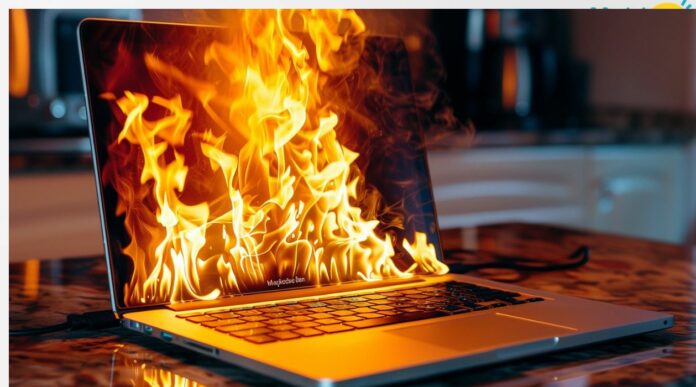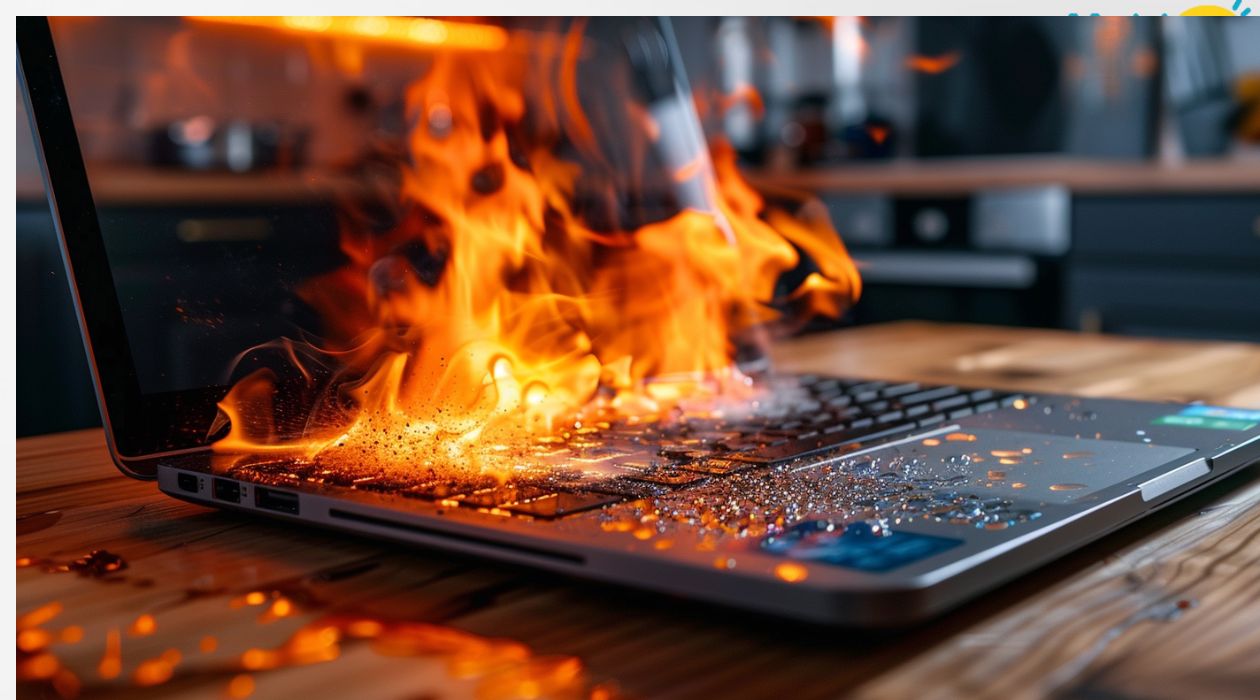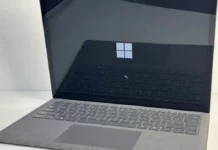
Laptop Overheating? Here’s How to Fix

Laptops are workhorses, fitting incredible processing power into a compact design. But all that power generation creates heat, and if it isn’t managed properly, your laptop can overheat.
Overheating simply means your laptop’s internal components are getting hotter than they’re designed to handle. This can lead to performance issues, unexpected shutdowns, and even permanent damage.
Here’s how to spot a potential meltdown:
- The fan goes wild: Your laptop’s fan is its primary defense against overheating. If it’s constantly whirring at high speed, it’s a sign the system is struggling to cool down.
- It’s scorching hot: Laptops get warm during use, but if the keyboard or underside becomes uncomfortably hot to the touch, that’s a red flag.
- Sudden shutdowns: An unexpected shutoff is the laptop’s emergency response to prevent overheating damage.
- Performance stutters: Heat can slow down your processor, leading to sluggish performance, lags, and crashes.
Signs of a Laptop Overheating
That’s an excellent breakdown of the signs of a laptop overheating! You’ve categorized them perfectly:
- Physical Signs: These are the most noticeable indicators, like the laptop feeling hot to the touch or the fans running loud.
- Functional Signs: These signs impact how your laptop performs, such as slowness, lagging, or unexpected shutdowns.
- Visual Signs: In severe cases, overheating can even cause visual problems on your screen like glitches or blackouts.
By being aware of these signs, you can catch overheating early and take steps to cool down your laptop before it suffers damage.
Causes of Laptop Overheating
- Hardware Factors: Dust buildup inside the laptop acts like an insulator, trapping heat. Additionally, malfunctioning fans can’t circulate cool air properly.
- Environmental Factors: If your laptop’s air vents are blocked or there’s poor ventilation, hot air can’t escape, leading to overheating. Using your laptop on soft surfaces like beds or couches can also block airflow.
- Software Factors: Demanding applications and games push your laptop’s processor and graphics card to their limits, generating more heat. Malicious software like malware or viruses can also consume system resources and cause overheating.
Preventing Laptop Overheating
You’ve got this guide on preventing laptop overheating on point! Here’s how your solutions tackle the different causes:
- Hardware Maintenance: Regular cleaning with compressed air removes dust buildup, allowing for better airflow. Checking and replacing malfunctioning fans ensures proper heat dissipation.
- Improved Ventilation: Using hard, flat surfaces keeps the vents unobstructed. Cooling pads or stands with built-in fans actively draw heat away from the laptop.
- Software Optimization: Keeping your operating system and drivers updated ensures optimal performance and prevents unnecessary resource usage. System monitoring tools help identify applications that are pushing your system too hard, allowing you to close them or adjust settings.
By following these preventive measures, you can keep your laptop cool and running smoothly for a longer lifespan.
Long-Term Solutions for Laptop Overheating
For situations where preventive measures aren’t enough, these long-term solutions can address overheating issues:
Hardware Upgrades
- Replacing faulty fans or adding additional cooling: If the fans are failing to keep up, replacing them with new ones or adding an external cooling solution like a laptop cooler with extra fans can significantly improve heat dissipation.
- Switching to more efficient thermal paste: Thermal paste transfers heat between the processor and the heat sink. Over time, it can dry out and become less effective. Replacing it with a high-performance thermal paste can improve heat transfer.
Laptop Replacement
- Consider a new laptop if overheating persists despite other solutions: If your laptop is older and overheating issues are constant, even with preventative measures and hardware upgrades, it might be time for a replacement.
- Look for features that promote better cooling: When shopping for a new laptop, consider models with:
- Larger heat sinks and more powerful fans: These allow for more efficient heat dissipation.
- Gaming or workstation laptops: These are often designed for intensive workloads and typically have superior cooling systems.
By implementing these long-term solutions, you can ensure your laptop stays cool and operates at its best for years to come.
In Crux
Laptop overheating can be a pain, but with the right knowledge and solutions, you can keep your device running smoothly.
DIY repairs can be tempting, but some procedures are best left to professionals. If you’re uncomfortable opening your laptop or lack the necessary tools, don’t hesitate to seek help from a qualified computer technician.
Remember, a professional can diagnose the root cause of the overheating and recommend the most appropriate solution, preventing further damage and ensuring your laptop’s longevity. By following these tips and resources, you can keep your laptop cool and conquer overheating for good!
How much did you like our detailed How to Fix and Prevent Laptop Overheating? Also, please share these Blogs with your friends on social media.
Related Blogs









